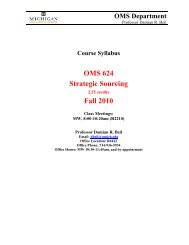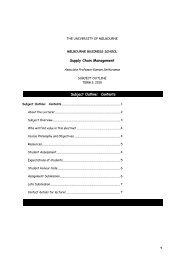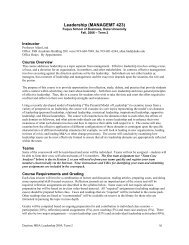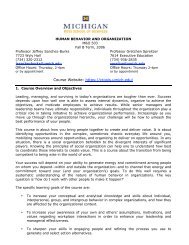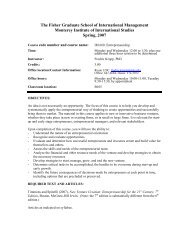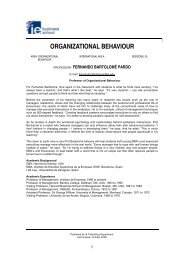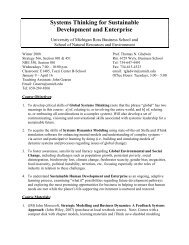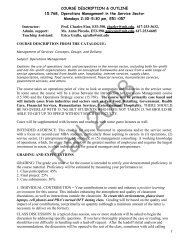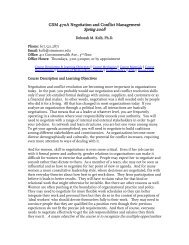behavioral decision making: biases, heuristics and errors.
behavioral decision making: biases, heuristics and errors.
behavioral decision making: biases, heuristics and errors.
You also want an ePaper? Increase the reach of your titles
YUMPU automatically turns print PDFs into web optimized ePapers that Google loves.
[X, 22] Lichtenstein, S. <strong>and</strong> Fischhoff B. (1980). "Training for calibration." Organizational<br />
Behavior <strong>and</strong> Human Performance 26(2): 149-171. Note: Explores the effects of<br />
training on probabilistic reasoning. If you are interested in consulting or HR, this<br />
paper may be worth a quick read.<br />
Questions to Consider<br />
• Part I: Is car buying problem discussed in the Science article a probabilistic reasoning<br />
task How is it relevant to this topic<br />
• Part II: After the readings you may realize that the Engineers & Lawyers IExperiment, the<br />
Taxicab problem, <strong>and</strong> the Down Syndrome problem from the pre-course questionnaire<br />
(refer to your Questionnaire) are all problems that involve using base rates. People tend<br />
to ignore/underuse base rates in Engineer, Taxicab <strong>and</strong> Down Syndrome problem -- but<br />
for different reasons. How are they different Bar-Hillel suggests several alternative<br />
explanations for why we frequently seem to err by ignoring base rates. What are these<br />
alternatives Which seem more/least compelling In what business contexts could you<br />
see these biased was of reasoning happening, <strong>and</strong> how might you avoid this Any ideas<br />
how this might apply to consumer choice<br />
SESSION 3<br />
Misconceptions of Chance: What Happens in Vegas Should Stay in Vegas.<br />
Readings<br />
[R, 8] Sections 7.3, 7.4, 8.6 an d8,7 in Hastie, R., & Dawes, R. M. (2009). Rational choice<br />
in an uncertain world: the psychology of judgment <strong>and</strong> <strong>decision</strong> <strong>making</strong> (2nd).<br />
Thous<strong>and</strong> Oaks, Calif.: Sage Publications.<br />
[Q, 1] ´Hot H<strong>and</strong>s' phenomenon: A myth (1988, April 19). The New York Times.<br />
[R, 5] Tversky, A., & Gilovich, T. (1989). The cold facts about the 'Hot H<strong>and</strong>' in basketball.<br />
Chance, 2(1), 16-21.<br />
[Q, 6] Wolff, A. (2002, January 21). The cover that no one would pose for: Is the SI jinx for<br />
real Sports Illustrated.<br />
[R, 7] Wainer, H. (2007). The most dangerous equation. American Scientist, 95(3), 249-256.<br />
[Q, 1] Business History Fan. (2007). In Search of Excellence - 25th Anniversary:<br />
Innovation. (Blog Entry)<br />
[X, 26] Joyce, E. J. <strong>and</strong> Biddle G. C. (1981). "Are Auditor's Judgments Sufficiently<br />
Regressive" Journal of Accounting Research 19(2): 323-349.<br />
[X, 10] Koning, R. H. (2003). An econometric evaluation of the effect of firing a coach on<br />
team performance. Applied Economics, 35(5), 555.<br />
[X, 22] Kahneman, D., & Tversky, A. (1972). Subjective probability: A judgment of<br />
representativeness. Cognitive Psychology, 3(3), 430-454.<br />
Questions to Consider<br />
• Hot H<strong>and</strong>: What bias (that we have already discussed) is likely driving at least some of<br />
<br />
(relevant to you) might the Hot H<strong>and</strong> bias/error apply Could this bias work in the<br />
opposite direction, leading people to miss real patterns when they actually are present If<br />
so, in what business contexts <strong>and</strong> how might this happen<br />
• Sample Size Insensitivity: The article focuses on an epidemiological example <strong>and</strong> refers<br />
to a few others. How might you extend this type of bias/error in judgment to<br />
management, business or economic contexts<br />
• Non-<br />
that the blogger, the Booz-Allen consultant, the money manager, Business Week <strong>and</strong> the<br />
writer(s) of the Wikipedia entry all seem to be missing How else might you explain<br />
<br />
between blindly inve<br />
<br />
performance, which would you choose<br />
Conjunctive & Disjunctive Reasoning: Research shows we often err in judging the<br />
<br />
multiple components. To what management <strong>and</strong> business tasks might this <strong>behavioral</strong><br />
finding apply How would it apply <strong>and</strong> what negative outcomes would you predict What<br />
could you do to prevent these outcomes<br />
5 |



